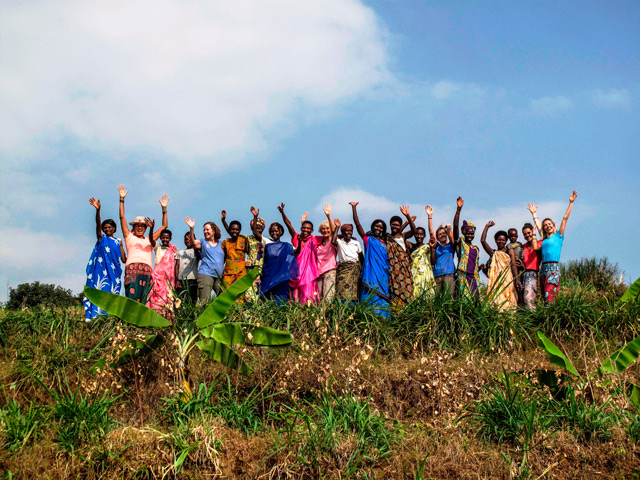Helping Hands Across the Sea
World Dance Remakes Lives After 1994 Genocide

GENOCIDE OF 1994: Quietly, without fanfare, a group of Santa Barbara women are setting an example to the world.
Led by Janet Reineck, they’ve used dance as a means to raise funds to aid survivors of the catastrophic 1994 genocide in the African nation of Rwanda. Money raised by World Dance for Humanity goes to 20 communities of people by “providing goats, cattle, student stipends, training, and support for small businesses,” Reineck told me.
“Each of these communities has its own profile. One is made up of former sex workers, while others include genocide widows, unwed mothers, orphans, disenfranchised poor farmers, and the Twa [pygmies], who emerged from their forest life to try to survive in the lowlands.

“Our largest group, Never Again Fellowship, is an extraordinary community focused on reconciliation between the Hutu, Tutsi, and the Twa — the three ethnic groups who had perpetrated or been the victims of unfathomable atrocities during the 1994 genocide.
“In 2008 a dozen people from the three groups made the courageous move to pool their efforts to stay alive. The idea worked. The members live together, work together, and are planning their future together, having sworn ‘never again’ to [engage in] ethnic violence.
“Our support has given them the means and confidence to save money, invest, and grow. There are now 2,666 people in Never Again Fellowship, divided into seven cooperatives.”
Reineck, a 2012 Independent Local Hero, teaches dance classes at the Santa Barbara Dance Center and City College Adult Ed, with all proceeds going to Rwanda. Throughout the year, the World Dancers reach out to wheelchair-bound seniors and disabled adults, “connecting through music and movement.
“When we’re not dancing, World Dancers volunteer at the Westside Boys & Girls Club, helping them serve 100 kids a day with limited staff,” said Reineck.
On October 29, about 200 dancers will move as one in the Courthouse Sunken Gardens, performing Michael Jackson’s “Thriller,” joining dancers in a worldwide movement, according to Reineck. Donations will go to the Rwanda Education Fund. Rehearsals start Sunday, September 17. Details are at worlddanceforhumanity.org. Smaller “flash mobs” in Halloween-ish costumes will perform around town and in the North County.
To us, a goat may be just a rural oddity, but to the poor of Rwanda, a goat is hope on four legs. World Dance partnered with Santa Barbaran Betsy Kain’s Goats for Life and then took on her legacy when she retired in 2013.
A woman named Catherine, as she held a black goat, said, “I am holding a brighter future for me and my family …. A goat is going to be the bringer of … change in my family. We live on doing agriculture in a poor way, [but] this goat will positively impact our production, and it will provide us with financial necessities while having offspring from it.
“There is no way to thank donors [who made] this happen for us. God bless them.”
A woman named Gratia said: “These are not just goats. They are so meaningful to us. We used to keep livestock before genocide, but genocide has taken everything away, including our hope to have livestock again. We did not have hope for our future, but because of you and your support, we have our livestock back, and we have hope for the future.
“We thank you to infinity and beyond, and I cannot thank you enough ….”
Margaritha sits next to a handsome black-and-white goat: “A goat you see me holding is the answer to my wish to belong to the community of change, well-being, hope, and respect in all ways. This goat will soon take me there. I am so appreciative to our donors.”
Peter Haslund, member of the Santa Barbara City College Board of Trustees, is board chair of World Dance. “I don’t know of any other philanthropic endeavor that more directly affects the lives of desperate people more effectively or more immediately than World Dance for Humanity.
“The driving force is the ability to provide a sense of hope where none existed, a sense of encouragement when only conflict prevailed, a sense of a positive future for all, regardless of tribal affiliation.”
In all, World Dancers donated $91,000 to Rwanda communities last year, Reineck said.



